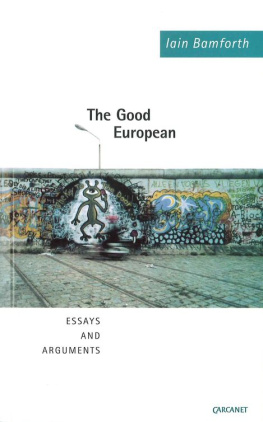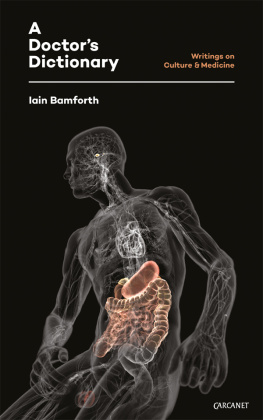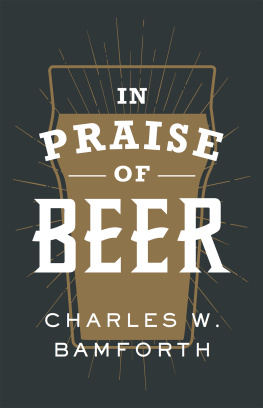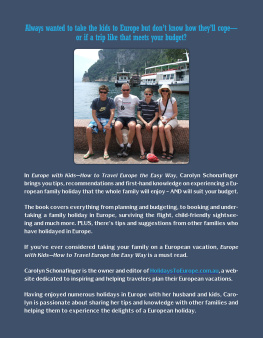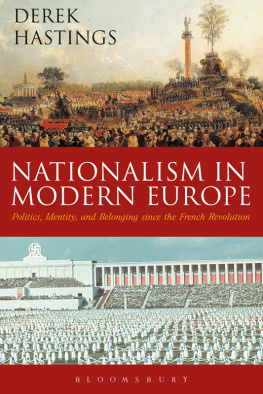As this revolution of the Strasburgers affairs is often spoken of, and little understood, I will, in ten words, says Slawkenbergius, give the world an explanation of it, and with it put an end to my tale.
Every body knows of the grand system of Universal Monarchy, wrote by order of Mons. Colbert, and put in manuscript into the hands of Lewis the fourteenth, in the year 1664.
Tis as well known, that one branch out of many of that system, was the getting possession of Strasburg, to favour an entrance at all times into Suabia, in order to disturb the quiet of Germany and that in consequence of this plan, Strasburg unhappily fell at length into their hands.
It is the lot of a few to trace out the true springs of this and such like revolutions The vulgar look too high for them Statesmen look too low Truth (for once) lies in the middle.
What a fatal thing is the popular pride of a free city! cries one historian The Strasburgers deemed it a diminution of their freedom to receive an imperial garrison so fell a prey to a French one.
The fate, says another, of the Strasburgers, may be a warning to all free people to save their money. They anticipated their revenues brought themselves under taxes, exhausted their strength, and in the end became so weak a people, they had not strength to keep their gates shut, and so the French pushed them open.
Alas! alas! cries Slawkenbergius, twas not the French, twas CURIOSITY pushed them open The French indeed, who are ever upon the catch, when they saw the Strasburgers, men, women, and children, all marched out to follow the strangers nose each man followed his own, and marched in.
Trade and manufactures have decayed and gradually grown down ever since but not from any cause which commercial heads have assigned; for it is owing to this only, that Noses have ever so run in their heads, that the Strasburgers could not follow their business.
Alas! alas! cries Slawkenbergius, making an exclamation it is not the first and I fear will not be the last fortress that has been either won or lost by NOSES .
The End of Slawkenbergiuss Tale in
Tristram Shandy (Volume IV)
W HAT should we make of him? Like William Godwin, father of Mary Shelley, he was a pedagogue incapable of practising what he preached. He wrote a treatise known to every educated person at the end of the eighteenth century on how to educate a young boy and left his own five children with the Foundling Hospital in Paris. Edmund Burke observed that his often-expressed love of humanity was a charade which excused him from any real concern with the suffering of men and women. Contemporary humanitarianism follows his impulse, allowing the heart and not history to lead it towards causes that can do no wrong: it doesnt care for human beings too much but it likes to take care of them. As Flaubert had to remind his mistress Louise Colet half a century later: Dont imagine that the pen has the same instincts as the heart. Rousseau was hopelessly dependent on his gouvernante Thrse Levasseur, not to speak of poor Madame de Warens, and yet proclaimed his proud Roman courage and his defiant independence : if he had a need it was for a lack of binding attachments. What we think of as ordinary sociability was for Rousseau the hell of mutual dependence: too many people aping each other. In spite of his preference for cultivated upper-class young ladies, with their soft skin and ribboned hair, at the age of 33 he made Thrse, an illiterate laundry maid met at the Htel Saint-Quentin in Paris, his lifelong companion: her malapropisms were so notorious Rousseau himself made a list of them to amuse Mme de Luxembourg. She could neither tell the time nor count, yet Rousseau claimed she possessed a stock of uncommon good sense which could be relied upon in times of difficulty. Many of his friends thought his helpmate a simpleton, though the ever rampant James Boswell, after a tryst with her in a boarding house in Dover, praised her amatory skills. She looked after Rousseau until his death, at the age of 66, in July 1778. He was as ready to praise the ordinary people like Thrse for their spontaneity of feeling as, with his next breath, to curse them for being lackeys to their masters. It was ever thus with Rousseau. The coolly subtle dialectician of The Social Contract becomes the radical free spirit of La Nouvelle Hlose, whose true voice of feeling when first heard in 1761 made readers, especially young women, swoon. Mary Shelleys famous phantasmagoria of the nursery owes more to him than it does to the men who told her ghost-stories in Geneva. The moonlit occasions of romantic love, as practised novelistically by Julie on St-Preux, and Rousseau himself on Sophie dHoudetot, were thrilling and deeply flattering. Love feeds, and feeds upon, the emotional needs aroused by its being physically thwarted: the kind of celestial transcendence written about by the Christian mystics has become the bubble of air in a spirit level inclining this way and that. Hundreds of letters addressed to the author confirm that his novel had caused a swell of emotional emancipation in the reading public; Goethes Werther was to do the same a few years later. The reaction of Mme de Polignac, who confessed in a letter to Mme de Verdelin that while she had no urge to meet Rousseau the philosopher Rousseau the novelist was a different matter, was typical of many urbane spirits: In my first impulse I was on the point of getting out the horses and going to Montmorency to see him at all costs and telling him how much his tenderness seems to me to elevate him above all other men; to make him show me the portrait of Julie and to kneel before the image of that divine woman. Both Kant, the legislator of rationalism, and his townsman Hamann, the first rebel against universal reason, took him to be one of their own; indeed, Rousseaus was the only portrait to be seen in Kants austere study. Much later, Claude Lvi-Strauss, in a famous phrase in Tristes Tropiques was to call him our master and our brother. Although he had no formal schooling and moved from job to job with regularity (he was at one time or other engraver, tax cashier, servant, clerk, personal tutor, piano teacher, diplomatic secretary in Venice and music copyist, which latter occupation brought in most of his earnings), the philosophes made him their darling. In return, he spiked the pages of their Encyclopaedia with little thought-bombs: his only and otherwise conventional article, on a non-musical subject, Economie politique, contained a passage which rather than upholding Lockes doctrine of the natural right to property suggests that legality is a mere patina concealing the worst kind of exploitation and injustice: Let us sum up in a few words the social contract of the two estates: You need me, because I am rich and you are poor; let us therefore make an agreement between us; I will allow you to have the honour of serving me, provided you pay me the little that remains to you for the trouble I take to command you. Diderot was most amused that, in an orthodox exposition of liberalism, Rousseau should be so hostile to the notion of property, a natural right, as to suggest it was injustice institutionalised. He stood at a crux in human affairs: the practical use of the mind which, from the beginning of recorded time, had been exclusively at the service of the bodys needs, was about to wreck havoc on nature in order to satisfy the appetites that living together in society had awakened in human beings. It was iron and corn which first civilised men, and ruined humanity: the Fall of Man must have occurred in the Neolithic Age then. In the

